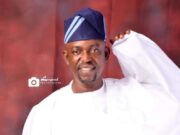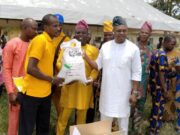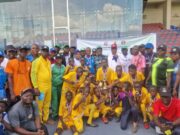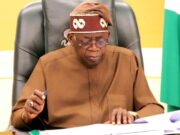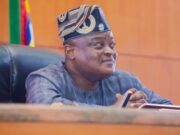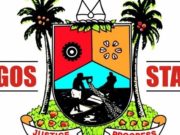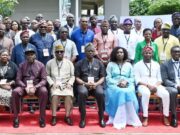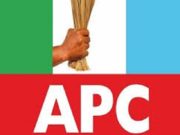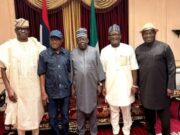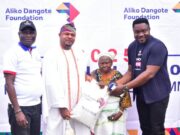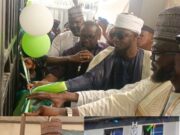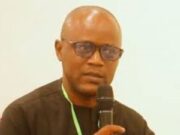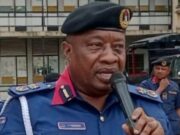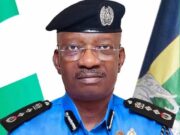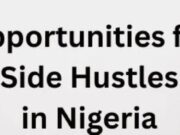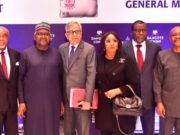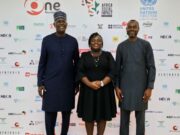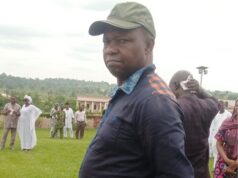If you diligently analyze social media’s initial reactions to the allegation that Mmesoma Ejikeme forged her Joint Admissions and Matriculation Board (JAMB) examination result, it would be difficult not to conclude that her race was her wrong. That she was wrong to have been born Igbo at a critical time like this. Or that the politics of her race was her albatross.
Ejikeme has attracted so odious comments to herself, similar to one who willfully pelted on herself a mound of excrement. Only on Friday, an Anambra state committee of enquiry revealed that she indeed faked the result.
Kaduna state-born senator, Shehu Sani, on Saturday, put the issue in its starkest perspective when he wrote on his Twitter handle: “The girl forged UTME result. The commentaries for and against her are more of the fallout of the 2023 election than just forgery. For most people talking, their tongues are about the forgery, but their hearts are politics. The girl committed an offence at a time when people are looking for a reason to keep the flames of verbal war alight. The girl flew a helicopter between the Border of Ukraine and Russia… Most Nigerians are now wearing ethnoreligious and political sunglasses; everything is viewed from the perspective of that lens. We are likely going to live like this for a very long time”.
Mmesoma’s first audacity, it will seem, was living and writing the JAMB examination in Anambra state. Didn’t she realise that that was the state of origin of Peter Obi, the Labour Party presidential candidate? It looked every inch an anathema. Her second infraction, from social media comments on the forgery, it seemed, was that she shared, even if tangentially, ethnicity with Gbadebo Rhodes-Vivour, LP’s Lagos gubernatorial candidate. Rhodes-Vivour’s mother is said to be Igbo.
Igbo had always received the Mmesoma pushback from the rest of Nigeria. While the north superintended over the terror pushback angle against the Igbo (recall the 1966 pogrom; the killing of scores of Igbo on allegation of defiling the Quran, like Godwin Akaluka; the civil war; a governmental terrorist attack that ‘tiny dot in a circle’ represents, etc) Yoruba’s confrontation with the Igbo has always been intellectual. It comes in the form of disdain for the Igbo’s claim to ethnic superiority. Another is the belief that Igbo leadership preferences and prejudices own ethnicity in what were supposed to be purely federal appointments.
The survival politics of the First Republic that Chief S. L. Akintola found himself in dictated that he allied with Hausa-Fulani. It was also what was responsible for his disdain for the Igbo. It was at a time when Nnamdi Azikiwe’s West African Pilot was accused of always unfairly projecting his Igbo stock, as against seeking the balance that journalism required. Some publications in the Pilot were perceived to have authenticated this charge. For example, the Pilot’s edition of December 30, 1938, on its front page, had as its lead story, ‘Two Ibo students pass doctorate exam. The paper also placed the photographs of these Ibos, R. M. Ojike and J. P. C. E. Okala, on its front page as well as that of Green Mbadiwe who it said was “a Nigerian millionaire and patron of higher education” and that of M. C. Okechuku whose “maternal nephew is proceeding to America to study medicine”.
Another case in point was the lead story of the newspaper for July 18, 1941, with the screaming title, ‘Ibibio student passes B. Sc (Agriculture) in U. S. A. The story had the photograph of the new graduate, Bassey U. A. Attah, who passed out from the College of Agriculture, Tuskegee in Alabama. Zik also had the speeches of these “Ibo achievers” published in the Pilot’s Inside Stuff column as messages home from abroad. Hardly did the Pilot have any positive report on such advancement among the Yoruba. On occasions when it did, the identity of the achiever was buried with the tag of an “African” given to the recipient of the higher degree. An example of this was the lead story of the Pilot for November 1, 1941. It was entitled, ‘African qualifies as a fellow of British Optical Association. The African in question was Olatunde Balogun.
While many claimed that Igbo’s quarrel with the Yoruba emanated from the failure of Azikiwe to clinch the region’s Premiership in 1952, it is said that the region’s disagreement with the Igbo began due to alleged favouritism and expansionism of the race. This led to the Chairman of the Nigerian Railways, Dr. Okechukwu Ikejiani, being given the Mmesioma treatment in the Western Region. Apart from campaign ground statements which Akintola made against Igbo, the Premier twisted the name of Ikejiani to a Yoruba adaptation so as to suit his pillory of the race. Akintola, reputed orator and very deep in Yoruba morphology, was wont to ask his audience, “The first (Igboman) would have, the second (Igboman) would have; what have you got?” This he deployed to underscore the nepotist character of not only Dr. Ikejiani, but the Igbo man, the typecast that conveniently suited the political conjuration of the Akintola NNDP of the time. The other famed quotation of this famous Yoruba language rich argot-dispenser was in the crisis of who became the vice chancellor of the University of Lagos between Professors Sabiru Biobaku and Eni Njoku. They were Yoruba and Igbo respectively. Playing on both professors’ names, Akintola was said to have told an audience that “we said we would give you a man who would not die (Yoruba translation of Biobaku), yet you insisted that it is the man who eats the dead (Yoruba literal translation of Eni Njoku) that you want!”
In support of the Akintola government’s bid to typecast the Igbo as nepotist and not worthy to partner with in the alliance that was then afoot, the battle became visible in the Sketch newspaper owned by the Akintola-led government. Exactly six days into its existence, on April 6, 1964, Sketch published a letter from one Odafe Othihiwa in its Our Readers’ View column entitled ‘£11,000 for Ikejiani alone?’ It was the beginning of a long-lasting structuring regime in the Sketch against both Ikejiani and his Ibo Union. The letter thus went further to state: “It is strange to observe that while we cry over unemployment in this country, people like Dr Ikejiani are holding at least five different posts on an alleged total salary of £11,000… I also call on the Prime Minister to probe the activities of Dr Ikejiani and his right-wingers in the Railway Corporation. It is no political bias”.
The newspaper, in the same edition, followed this up with a feature on its back page edition of April 6, 1964, entitled ‘Staggering situation in rail’ where it alleged that a “very serious tribal warfare” was going on in the railway corporation and that when the corporation’s 50,000 workers resumed, they would “break into two camps – the Yorubas and the Ibos”. It accused Dr. Ikejiani, who is “by nature very loquacious” of employing a medical doctor who earned an annual salary of £2,600 and yet had no job because the hospital earmarked for him by Dr. Ikejiani was not going to be ready in the next 18 months. It ended the piece by attaching an appeal to the president of the Egbe Omo Olofin, Chief H. O. Davies, by the secretary, on account of Ikejiani’s sack of the deputy assistant general manager of the corporation, Mr F. M. Alade, which it said “was deteriorating”.
In the same edition, the Sketch carried a rather sarcastic story on its front page with the title, ‘Yoruba nru, Ikejiani nsanra‘ meaning that while the Yoruba race was going lean, Ikejiani (and invariably, his stock) were getting fatter. The newspaper was however forced to publish a full-page advertorial by the Ikejiani railway corporation on the staff strength, designation, tribal origin and position of workers in the corporation with the title ‘Nigerian Railway Corporation: Facts you must know about staff position’, maintaining that the accusation of tribalism was made to “inflame inter-tribal hatred in an attempt to gain political advantages to the detriment of our young country’s advancement”. But in the same edition, the Sketch published an editorial entitled, ‘What is official?’ (Daily Sketch, April 10, 1964). Therein, it accused Ikejiani of running the corporation like “secret societies, cabals or tribal cults where anything goes” and urged him to “publish staff lists, monthly or annual returns, bulletins, railway assets and liabilities. His own salary and allowances, as well as those of his top aids (sic) and underdogs, workers and labourers alike, must be public property.” The Akintola government later released a White Paper that detailed allegations of nepotism against Ikejiani. It alleged that out of a grand total of 431 names on the staff list of the corporation, 270 were Igbo and 161 of other ethnic groups; of the 57 direct senior appointments made by the corporation, 27 were Igbo, eight were from other tribes and eight others were expatriates.
I went into the archive to bring out the above historical narrative so as to be able to explain that what we see today as acrimonious Yoruba/Igbo relations didn’t start today. In spite of the fact that the two races have a lot in common, politics and race for ascension into elective and appointive political offices have torn them asunder; so much that, like the words of Obierika to the white man in Chinua Achebe’s Things Fall Apart, he “has put a knife on the things that held us together and we have fallen apart”. It is so bad that Hausa/Fulani who allegedly killed Igbo people in thousands through the pogrom are not as resented by the Igbo as they do the Yoruba. The ethnic fissures are indeed becoming very frightening.
Some leaders attempted to kill the ghost of this ethnic division. Bola Tinubu in Lagos and Chimaroke Nnamani in Enugu’s appointments of Igbo and Yoruba into their cabinets began to redraw this acrimonious graph and to re-contextualise the disunity. Today, the relationship has become worse and is back on a cliff edge. When Governor Peter Mbah of Enugu state recently appointed a renowned broadcast journalist, Ladi Akeredolu-Ale, to head his state’s broadcasting service, an otherwise knowledgeable senior journalist went to town to denounce this. As I read his doggerel, Bob Marley’s evergreen track, “they don’t want to see us unite… all they want us to do is, keep on fussing and fighting…” sieved into my head. Why are people’s hearts filled with bottomless hatred for the other man as this?
To be candid, the 2023 elections have further put a wedge in tribal relations between the two ethnicities. When you read the quantum of bile exchanged between Yoruba and Igbo on social media, you will be pessimistic about a future for the two races together. Unfortunately, for both, they have been so mutually enfolded into each other that it is in their individual interest to live in amity.
Yesterday, I read an interview granted the Vanguard newspaper by the president general of the apex Igbo socio-cultural organisation, Ohanaeze Ndigbo, Dr Emmanuel Iwuanyanwu. “We don’t have security problems in the southeast. We have said ‘release Nnamdi’ because the young people are supporters of Nnamdi Kanu, which is an excuse that they give. When we look at it seriously, we have not seen any offence committed by Kanu. In fact, the court has said he should be released. As Igbo leaders, we do not see the reason he is being kept in detention. These people are giving it as an excuse for their sit-at-home. We believe that keeping Nnamdi Kanu in prison is an effort to collaborate with some elements who want to destroy the economy of states in the southeast,” he said.
To me, Iwuanyanwu was not sincere with himself or the Igbo race in that interview. If the truth must be told, Igbo’s reaction to Muhammadu Buhari’s bigotry was extreme. No sane government would condone the vile, sadistic commentaries from Nnamdi Kanu before his arrest or the unleashing of terror on the Nigerian state by felons loyal to him called ‘Unknown Gunmen’. What were Igbo elders like Iwuanyanwu doing while Kanu constituted himself into such unmitigated outlawry? What were they doing while he forcefully blocked the economic windpipe of the race by declaring a sit-at-home?
Even ex-governors of the zone during the garrulous gangsterism of Kanu appeared so complicit and cowed by the roar of the uncouth lion that Kanu was. How has sitting at home on Mondays by the very entrepreneurial southeastern people, calculated to have set its economy backwards by billions, helped in advancing the cause of Kanu’s release or the injustices that have been forced down the throat of the race by successive Nigerian governments? Did the weekly economic injuries which the Igbo inflicted on themselves by that act of calculated indolence, in any way, affect Buhari or wake him up from his eight years of perpetual somnambulist governance?
At the risk of immodesty, I am one of the few non-Igbo who can speak the truth to the race. This is because I have spoken variously about the depth of love I encountered when I lived among the people. Igbo are one of the most beautiful races in the world. When then-Governor Chimaroke Nnamani brought me to Enugu in 2003, he opened the water trough of the beauty, serenity and calmness of Igboland for me to gulp in abundance. Ever since, my fate seems intertwined with the land’s. Whenever I cross the Niger River, I feel at home.
However, let us tell ourselves the truth: Igbo’s sheepish conformity with the illogicality of Sit At Home appears to the rest of the world a benign version of the suicide bomber mentality. To put it mildly, it is crazy. While the suicide bomber extinguishes themselves to destroy others, in sitting at home, Igbo destroy themselves while assuming they are taking a pound of flesh from Nigeria. The inability of the elders of the race to stop the crimson-red dent on Igboland by unknown gunmen and the impression they created that violence is inextricably woven into the Igbo race, is fatal to the perception of the globe of an Igbo man.
Igbo’s immediate rash reaction to Mmesoma Ejikeme’s forged result is the same uncritical stand it took about Nnamdi Kanu’s incarceration. It was a ‘We and Them’ response. Almost immediately, former minister of education, Oby Ezekweseli, called for further investigation into the allegation against the Igbo girl. I thought the first thing to do was to condemn the act, not necessarily the young girl and then ask for a probe. Innoson Motors, an Igbo-owned company, also immediately promised a N3 million scholarship for the young girl. Asari Dokubo, the south-south violence-baiting man then threw into the ring his known hatred for the Igbo. Mmesoma must be older than 19 because – wait for it – his own daughter was 15 when she sat for the same examination! What a puerile logic.
The Yoruba’s reaction to the Mmesoma conundrum was also a continuation of the age-long tiff between it and its Igbo “enemy”; which should not be. Ethnicity should not have any role to play in ethical considerations. Whether Igbo, Hausa or Yoruba, wrong should have no binary name. It was this same ethnocentric position we all took in the choice of who to mount political offices in the last general elections.
I think Igbo should extinguish the ghost of the incorrigible sit-at-home and unknown gunmen violence first before embarking on diplomatic shuttles for Kanu’s release. Those two issues are staining the white garment of this beautiful race.
- Popular columnist, Dr Festus Adedayo sent this in from Ibadan, the capital city of Oyo State





